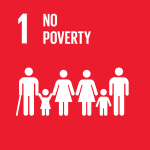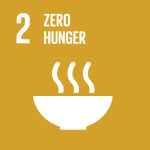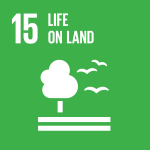
The semi-rural areas of India’s Mumbai Metropolitan Region are home to many lakes and ponds—natural water bodies that once sustained communities and ecosystems. Today, however, many of these water sources are heavily polluted. In the absence of central sewage systems, a mix of untreated wastewater, household sewage and solid waste now flows directly into the lakes. The result: degraded local environments, declining water quality and growing threats to public health and livelihoods.
At the same time, climate change is intensifying India’s water insecurity. Erratic rainfall patterns and declining groundwater levels are straining agricultural production, public health and food systems. In 2016, following two years of low rainfall, reservoirs ran dry, with more than 300 million people facing severe water shortages.
To address this challenge, the NGO Society for the Promotion of Area Resource Center (SPARC), with support from the UNDP-Adaptation Fund Climate Innovation Accelerator (AFCIA), is piloting nature-based solutions to restore these lakes and strengthen the resilience of surrounding communities.
Reviving lakes with community-driven innovation
Using satellite remote sensing, SPARC mapped just over 3,000 waterbodies across the region, identifying at least 900 waterbodies close to vulnerable settlements. To support restoration efforts, SPARC established two federations of 20 community members in the villages of Ganeshpuri and Satpala. These groups are now working in partnership with local NGOs and government representatives to develop sustainable, community-led water management systems. This participatory approach is helping to ensure long-term success, backed by political support and access to sustainable financing.

Waterbody surrounded by houses at Ganeshpuri.Photo:SPARC
Nature-based solutions for clean water
To tackle pollution and restore vital water resources, SPARC is introducing natural wastewater treatment systems that harness the power of nature. These systems use reed beds and beneficial bacteria to purify wastewater, which is then filtered through bamboo sieves before flowing into nearby lakes. The cleaned lake water seeps into the ground, recharging household wells and irrigation systems. Even solid waste extracted during treatment is repurposed as fertilizer, ensuring a zero-waste solution.
“Our ancestors preserved these lakes, ensuring the water collected during the monsoon would last through the year. Now, these lakes are choked with garbage polluted by sewage and gutters, and the health of the surrounding forests is deteriorating. Our ancestors left us many resources and it's our duty to preserve them rather than deplete them.” – John Benjamin Pereira
Design drawing of the proposed water treatment system showing the homes, reed beds and lake. Photo: SPARC.
The village of Ganeshpuri, around 80km north of Mumbai city was the first to adopt this approach. SPARC began by conducting a detailed household survey, mapping water sources and discharge points from toilets, baths, kitchen sinks and washing areas. This data is now helping the community to intercept wastewater at its source and direct it through the new treatment system before discharging it safely into the central lake.

Surveying the community in their homes to map wastewater sources. Photo: SPARC
As part of the lake restoration work, SPARC has also developed a prototype structure to secure the lake edges. The design consists of concrete or stone frames with built-in spaces for planting trees and shrubs along the water’s edge. These green banks will prevent erosion while restoring local biodiversity.
Following a site visit, the Block Development Officer of Ganeshpuri formally endorsed the nature-based approach by issuing an official letter of support.
Design image of the concrete frames to hold the edges of the lakes in place, the frames will allow plants to be grown on the water banks. Photo: SPARC
Building livelihoods alongside resilience
Beyond environmental benefits, the lake restoration efforts in Ganeshpuri and Satpala also support community livelihoods. Clean water and healthier ecosystems help cool the local microclimates, while also offering spaces for recreation and social connection.
“With the climate changing, it became clear that the waste being dumped into the water needed to be cleaned up to ensure the safety and health of people and children. If the water body is cleaned, the atmosphere will become cooler and more pleasant.” – Sangeeta Chandrakand Medha, community member from Ganeshpuri
An important livelihood around Mumbai has traditionally been fishing, but India’s national fish catch is predicted to decline by ten percent by 2050 due to climate change. Fishing communities around Mumbai are already feeling the impacts, with many struggling to make ends meet.
To help reverse this trend, SPARC’s nature-based solution includes provisions for future economic revitalization. Once the lakes are restored, they will be used for fish farming and duck rearing. In Ganeshpuri, a local women’s group is already planning a cooperative fish farming initiative to generate income.
“Treating this lake is crucial, which is why I fully support this initiative. After the water is treated, the wastewater flowing into the lake will be filtered, allowing us to breed high-quality fish and providing women with new economic opportunities.” – Pereira

Residents of Satpala assess the condition of their local lake ahead of restoration efforts. Photo: SPARC
A model for scalable impact
Ganeshpuri and Satpala are proving that small villages can spark big change.
The immediate impacts of cleaner water, combined with the long-term potential for livelihood development, offers hope to semi-rural communities across the region. With continued support, these pilots are set to provide scalable models for nature-based wastewater management throughout the Mumbai Metropolitan Region – ensuring cleaner water, greater climate resilience and expanded economic opportunity for generations to come. Their success underscores the power of community-led innovation, supported by partnerships like the UNDP-Adaptation Fund Climate Innovation Accelerator, to drive lasting transformation from the ground up.
*
Supported by financial contributions from the Adaptation Fund and the European Union, the UNDP-AFCIA programme has awarded 44 micro and small grants to locally led organizations across 33 countries worldwide, accelerating their innovative solutions to build resilience in the most vulnerable communities.
UNDP-AFCIA is one of two featured programmes under the Adaptation Innovation Marketplace (AIM), a multi-stakeholder strategic platform that promotes scaled-up adaptation at the local level.




